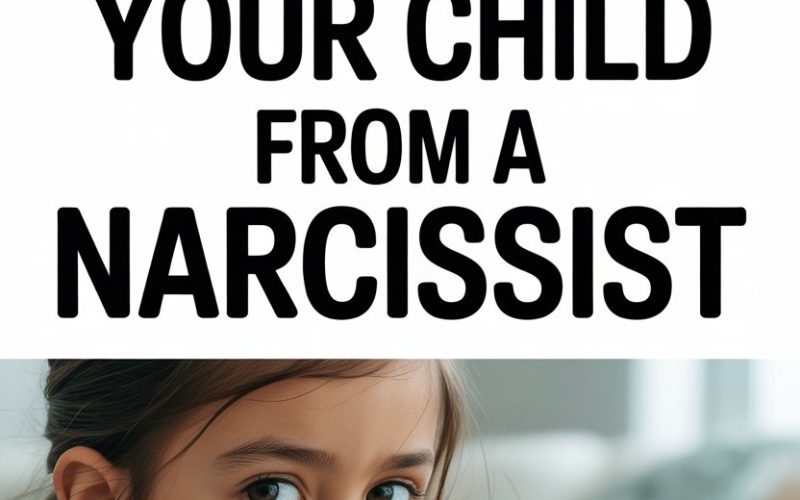Narcissists have a knack for making life, well, complicated.
If one is hovering around your child—say, an ex, stepparent, grandparent, or another adult in their orbit—it’s enough to leave any parent with a migraine and a strong urge to Google “how to build a forcefield.”
While there’s no device for that (yet—get on it, science), there are tried-and-true ways to help your child spot narcissistic behavior, keep their self-worth intact, and stay resilient.
Spot the Signs Early
Narcissists rarely announce themselves with a “Hi, I’m here to emotionally confuse you!” Still, their patterns show up in ways that even a frazzled parent can learn to recognise.
Watch for adults who always need to be the center of attention, refuse to take responsibility for mistakes, or twist conversations to make themselves look good.
Does your child seem perpetually anxious around one particular adult, or express confusion about what’s true after spending time with them? Classic red flags.
Children exposed to narcissists often feel like they’re walking on eggshells.
If your child says things like, “I’m always to blame,” or starts doubting their own version of events, take it seriously. Their gut is often more tuned in than we give them credit for.
Teach Your Child It’s Not About Them
Narcissists blame, shame, and project. Without the right tools, children will internalise these behaviours, assuming they’re at fault.
Kids need to hear, early and often, that the problem isn’t them. Use clear, age-appropriate language: “Sometimes people say mean things because they’re upset about themselves, not you.”
This concept is simple enough for a six-year-old but remains equally important for teens.
When possible, share stories or examples (real or fictional) where someone acted unkindly, and talk about all the reasons it might not be personal. Storytime doubles as emotional armor.
Strengthen Self-Esteem Like It’s an Olympic Sport
The best antidote to narcissistic poison? Bulletproof self-worth.
Help your child recognise their strengths, celebrate their efforts, and remind them they are loved—no matter what.
Studies have shown that children with higher self-esteem are less likely to be manipulated by critical or self-absorbed adults.
A few ways to bolster their confidence:
- Encourage activities that build mastery (sports, art, coding, theatre—pick your flavour).
- Praise effort, not just outcomes.
- Let them overhear you bragging about them to someone else (they’ll pretend not to care, but it sinks in).
Every “You matter” is a stitch in their invisible shield.
Set Boundaries Without Guilt
Narcissists hate boundaries the way toddlers hate bedtime. Expect pushback.
Kids need to know it’s okay to say no, ask for space, or refuse to share personal details. Practice simple phrases together: “I don’t want to talk about that,” or “Please stop.” Even small children can learn to articulate boundaries.
If your child feels uncomfortable around a particular adult, believe them. Don’t force hugs or conversations.
Model boundary-setting in your own life—let them see you saying “no thanks” to requests that don’t feel right.
Dr. Ramani Durvasula, a leading expert on narcissism, has highlighted the importance of clear boundaries for children, suggesting that “kids need explicit permission to protect their own emotional space” (source).
Supercharge Emotional Literacy
Narcissists rely on confusion and self-doubt to keep others in line. Emotional literacy—being able to name, understand, and express feelings—is your child’s torch in the dark.
Get comfortable talking about feelings at home, using simple check-ins like “How are you feeling about what happened?” or “That looked tough. Want to talk about it?”
Teach them words for emotions beyond “happy” or “mad”—disappointed, frustrated, proud, and so on.
Books and shows that model emotional intelligence can help. Try titles like “The Invisible String” or episodes of “Bluey” that unpack tricky feelings with humor and warmth.
Keep Communication Open, Even When Your Eyes Are Glazing Over
Teen rants about Minecraft or the 800th retelling of a playground saga might test your patience, but the real gold comes out when kids feel safe to talk about anything.
Let your child know they can always come to you, no matter how big or small the problem. Listen more than you talk. Avoid launching into fixes right away.
Sometimes, “That sounds really hard” is all a kid needs.
Keep the lines open, especially if your child splits time between homes. Phone calls, silly memes, a quick “thinking of you” text, or even a shared journal all reinforce that you’re their safe person.
Create a Support Squad
When a narcissist is in the mix, you can’t always be everywhere (unless you’ve mastered cloning, in which case, please share your secrets). Surround your child with other adults who can model healthy relationships.
Think teachers, coaches, family friends, or relatives who “get it.” Let them know what’s going on, so they can back up your child if needed.
Sometimes, hearing from a favorite aunt or Scout leader that “It’s okay to have boundaries” packs extra punch.
Therapists who specialise in narcissistic abuse can be game-changers. If you’re worried, don’t wait for things to get dire. Even a few sessions can teach kids (and parents) strategies for coping and healing.
The Narcissist Abuse Support website lists resources for finding qualified professionals.
Limit Exposure Where Possible
Shared custody? Daily school runs with a narcissistic ex?
Sometimes, you can’t keep your child away from this person, no matter how much you’d like to send them off to Hogwarts for the semester.
Every little bit helps. Choose neutral ground for handoffs. Stick to short, structured visits. Avoid situations where your child is left alone with the narcissist for extended periods.
If you have legal rights, don’t hesitate to use them—especially in cases of emotional or physical harm.
Family courts may not always “get” narcissism, but documenting patterns and enlisting support from a guardian ad litem or child advocate can make a difference.
Is it exhausting? Absolutely. Is it worth it? Every single time.
Model Healthy Relationships
Kids learn what love looks like by watching you. Show them what mutual respect, kindness, and clear communication look like in practice.
Let them see you apologising when you mess up, thanking people, and handling disagreements without drama. Point out healthy relationships in books or shows. (“See how they listened and worked it out together? That’s what respect looks like.”)
Sometimes, the healthiest thing you can do is leave a toxic relationship yourself. That’s not failure. That’s teaching your child that self-care is non-negotiable.
Focus on What You Can Control
Dealing with a narcissist can make parents feel helpless. The truth? You can’t change them—but you can control your response and the environment you create for your child.
Keep routines predictable. Celebrate small wins. Build family rituals that foster connection and safety (yes, even if it’s just Friday night takeaway and silly movies).
Give yourself grace. No parent can shield their child from every storm. But by giving them tools, support, and unconditional love, you’re already doing more than most.
Looking After Yourself, Too
Parental burnout is real—especially when a narcissist is involved. Your oxygen mask goes on first.
Find your own support system, whether that’s therapy, friends who get it, or online communities like One Mom’s Battle. Take time for yourself, even if it’s just a quiet cuppa in the car before school pickup.
Your resilience becomes theirs. And if you occasionally hide in the pantry eating biscuits, consider it self-care.
Raising Strong Kids in the Shadow of Narcissism
No parent wants their child in the crosshairs of a narcissist.
Yet, with the right tools, empathy, and a steady dose of humor, kids can emerge not just unscathed but stronger, wiser, and ready to spot self-absorbed nonsense from a mile away.
You can’t bubble-wrap the world, but you can give your child everything they need to thrive—even if the path gets a bit bumpy.
And sometimes, that’s the greatest gift of all.





